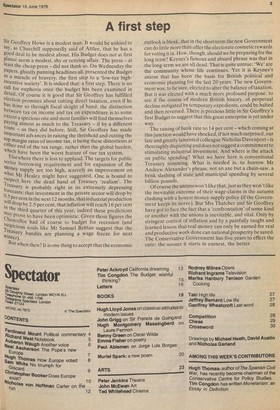A first step
Sir Geoffrey Howe is a modest man. It would be unkind to say, as Churchill supposedly said of Attlee, that he has a good deal to be modest about. His Budget does not at first glance seem a modest, shy or retiring affair. The press — at least the cheap press — did not think so. On Wednesday the Papers, ghastly punning headlines all, presented the Budget aS a miracle of bravery, the first step to a low-tax highincentive society'. It is indeed that: a first step. There is no call for euphoria once the budget has been examined in detail., Of course it is good that Sir Geoffrey has fulfilled election promises about cutting direct taxation, even if he has done so through fiscal sleight of hand: the distinction between tax on income and tax on expenditure is to some extent a specious one and most families will find themselves Paying almost as much to the Treasury — if by a different route — as they did before. Still, Sir Geoffrey has made Important advances in raising the threshold and cutting the top margin rates of income tax, it being these distortions at either end of the tax range, rather than the global burden, Which have been the worst feature of our tax system. Elsewhere there is less to applaud. The targets for public sector borrowing requirement and for expansion of the money supply are too high, scarcely an improvement on What Mr Healey might have suggested. One is bound to suspect here the dead hand of Treasury 'realism'. The 4Treasury is probably right in its extremely depressing ,T recasts: that investment in the private sector will drop by u.5 Percent in the next 12 months, that industrial production Y"ill drop by 2.5 per cent, that inflation will reach 16 per cent tri the third quarter of this year; indeed these predictions _IrlaY prove to have been optimistic. Given those figures the k-hancellor had of course to budget for recession (and _suspicious souls like Mr Samuel Brittan suggest that the Treasury bandits are planning a wage freeze for next Wintery But when then? It is one thing to accept that the economic outlook is bleak, that in the short term the new Government can do little more thah offer the electorate cosmetic rewards for voting it in. How, though, should we be preparing for the long term? Keynes's famous and absurd phrase was that in the long-term we are all dead. That is quite untrue: 'We' are the community whose life continues. Yet it is Keynes's axiom that has been the basis for British political and economic planning for the last 20 years. The new Government was, to be sure, elected to alter the balance of taxation.
But it was elected with a much more profound purpose: to see if the course of modern British history, of perpetual decline mitigated by temporary expedients, could be halted and then reversed. There is precious little in Sir Geoffrey's first Budget to suggest that this great enterprise is yet under way. The raising of bank rate to 14 per cent — which coming at this junction would have shocked, if not much surprised, our late and greatly lamented colleague Nicholas Davenport is thoroughly dispiriting and does not suggest a commitment to . stimulating industrial investment. And where is the attack on public spending? What we have here is conventional Treasury trimming. What is needed is, to borrow Mr Andrew Alexander's phrase, not an axe but a chain-saw, a brisk slashing of state and municipal spending by several billion pounds. Of course the unions won't like that, just as they won't like the inevitable outcome of their wage-claims in the autumn clashing with a honest money supply policy (if the Govern ment keeps its 'nerve). But Mrs Thatcher and Sir Geoffrey have got to face the fact that a 'confrontation' of some kind or another with the unions is inevitable, and vital. Only by stringent control of inflation and by a painfully taught and learned lesson that real money can only be earned for real and productive work done can national prosperity be saved. The Conservative Government has five years to effect the cure: the sooner it starts in earnest, the better.


































 Previous page
Previous page